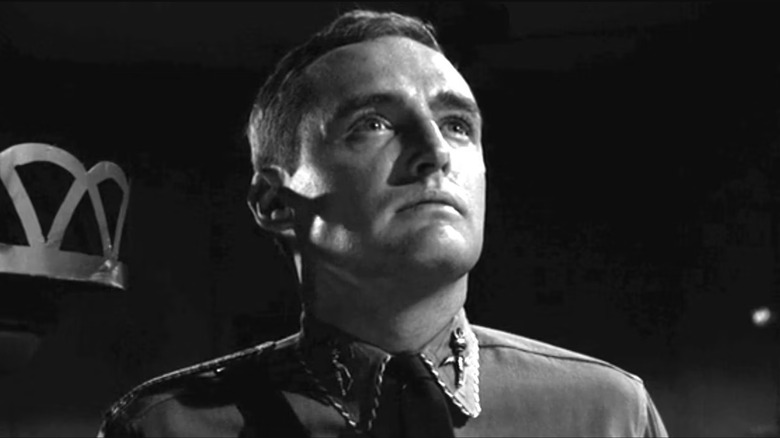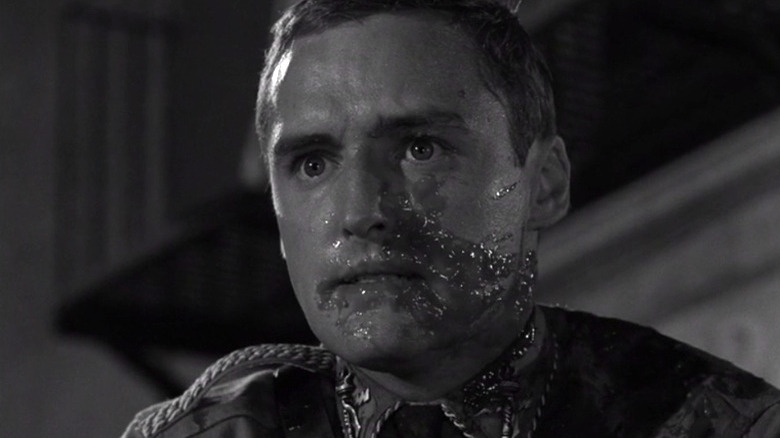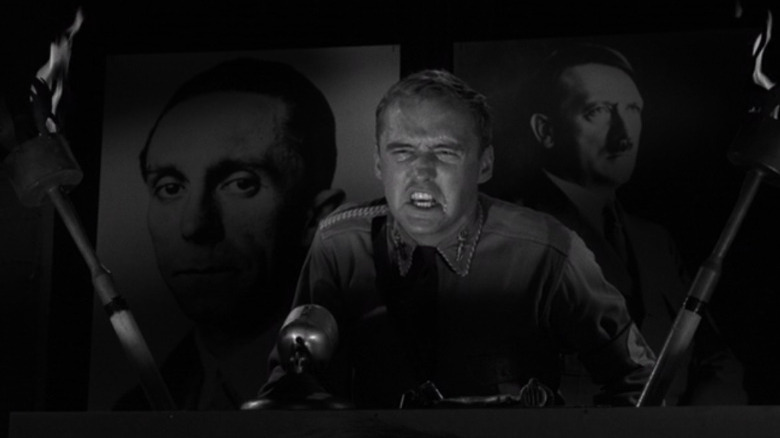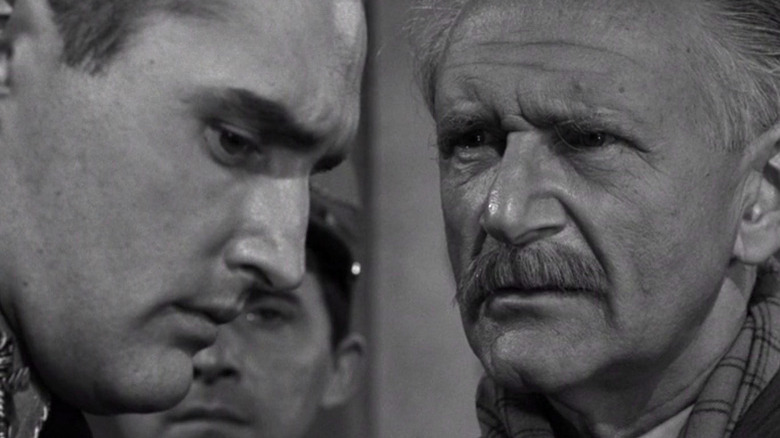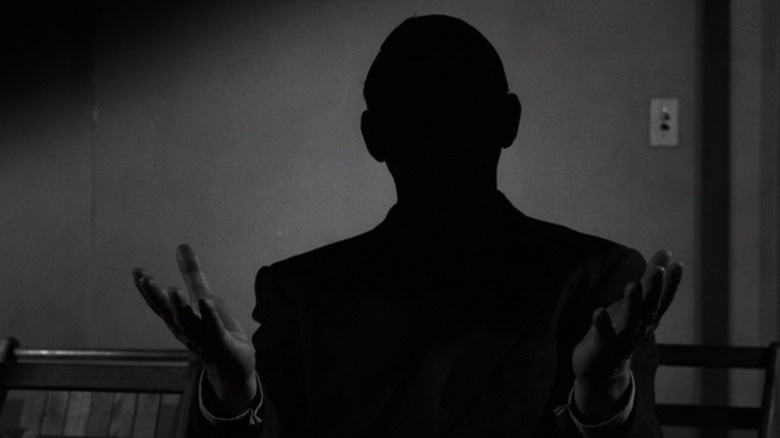Dennis Hopper Starred In A Twilight Zone Episode That Warned Of The Rise Of American Fascism
Not every work of art withstands the test of time. Sometimes that's just because a new generation has different tastes in stories and storytelling styles. Sometimes it's because the artwork is the product of a very specific moment, and is difficult to appreciate without understanding the cultural, political, sociological, and/or artistic context in which it was created.
It's usually a treat to discover that a film or a TV show made decades before you were born still retains most, if not all of its power. But sometimes it's also deeply sad. That's because many films and TV shows attempt to speak about the tragedies of society, and the evils we encounter every day and must remain ever vigilant against. To watch those films generations after they were produced and discover that their themes and their warnings are still relevant — and maybe even more relevant than ever — speaks highly of the artists who created them, but poorly of a world that failed to pay attention to their work.
The sci-fi/fantasy/horror anthology series "The Twilight Zone" was never one to shy away from serious topics, but some of its episodes hit harder than others. The harrowing season 3 episode "Death's-Head Revisited" tells the story of an aging Nazi who visits the site of a concentration camp where he committed unspeakable acts, and is confronted by the ghosts of his victims.
But "The Twilight Zone" didn't stop at exploring the horrifying history of fascism. In the season 4 episode "He's Alive," it also warned us that fascism could rise in the United States. All the bigots had to do, the show argued, was find a way to make their message palatable to mainstream audiences.
Sadly, it's an episode that is still disturbingly relevant.
'He's Alive'
"He's Alive" tells the story of Peter Vollmer, an insecure and angry young white supremacist, played by Dennis Hopper (six years before he directed the industry-altering independent drama "Easy Rider"). At the start of the episode, Vollmer struggles to deliver his message of racism, xenophobia, anti-Semitism, and wild conspiracy theories to a hostile crowd. Pelted with garbage and punched out in the streets by Americans who — less than 20 years after World War II — remember the importance of rejecting Nazi ideology, Vollmer gives up for the evening, dismissing everyone who disagrees with him as "communists."
Vollmer was raised in an abusive and neglectful household, and the only person who ever cared about him was a Jewish man, a survivor of the Dachau concentration camp. Ernst Ganz (Ludwig Donath, "Torn Curtain") thinks of Vollmer as a little boy seeking attention, making mistakes, but still perhaps redeemable. Ganz suspects that his own sentimentality and concern for his fellow man, even a hateful man hiding his prejudice behind an unconvincing veil of "philosophy," may be his own weakness. But Ganz has something that Vollmer is desperately trying to destroy within himself ... human empathy.
Had the story stopped there, maybe Vollmer might have looked inward for validation and realized that acceptance was the only thing that brought him any happiness. Instead, he's met by a mysterious benefactor, seen only in shadow, who tells him the secret to properly peddling fear and rage.
Essentially, he teaches Vollmer how to become a successful angry YouTuber.
Stoking the audience's fears
"Make your hate their hate," the shadowy man teaches Vollmer. "If they are poor, talk to them of poverty. If they are afraid, talk to them of their fears. And if they are angry, Mr. Vollmer, if they are angry give them objects for their anger."
Vollmer quickly learns that weaponizing his audience's hate, instead of merely espousing his own, is the way to trick otherwise rational audiences into adopting hateful ideology. By making his base think they are victims and treating society's most vulnerable people as potential threats, he instills a cult-like furor. Vollmer rejects accusations that he and his followers are prejudiced. Because he and his followers devote themselves to an oppressive ideology most people find ignorant and/or evil, Vollmer claims that means his white Christian followers are the actual oppressed party. "We are the minorities!" Vollmer yells to a cheering, white crowd, because "to live in a free, white America is a minority opinion!"
It's staggering how quickly this new messaging works. Vollmer's crowd grows but to move them to action, his shadowy teacher tells him he needs a martyr to rally behind. Instead of waiting for one, he should create one. Vollmer orders his most cowardly underling killed, with a note left on his chest declaring him "a good Nazi," to inspire fear in his other followers and make them think the people they wish to oppress are violent and therefore must be oppressed.
No more laughter
Ganz has witnessed Vollmer's rise to power, and he's had enough. He remembers that dismissing bigotry leads to bigotry's rise. "We ignored them, or laughed at them, because we couldn't believe that there were enough insane people to walk alongside them," Gantz recalls. "And then one morning the country woke up from an uneasy sleep and there was no more laughter."
So Gantz walks up to Vollmer in the middle of his latest speech, in front of the crowd, and declares him merely a "new model" of Adolf Hitler. "A 1963 führer right off the assembly line," he calls a stunned Vollmer, before declaring that all sad bigots like Vollmer are alike, and that they "take applause like a needle."
Demoralized, and having briefly lost the crowd, Vollmer retreats to his shadowy benefactor, who reveals that even though he isn't getting his hands dirty, he hasn't asked Vollmer to do anything he hasn't done before. He finally steps out of the shadows and reveals that he is Adolf Hitler, summoned into being by those who adopt his ideologies and tactics. Hitler, and by extension all white supremacy, is literally being kept alive by anyone who weaponizes hatred like he did.
Where will he go next?
"He's Alive" ends with Vollmer killing Ganz, believing that he has rid himself of human frailty, unaware that those last fragments of decency were all that kept him human. The police finally come to arrest him for the death of his henchman, at which point Vollmer runs and gets shot. As he dies, the unmistakable shadow of the 21st century's greatest monster walks away from him, as Rod Serling — who wrote this episode — says:
"Where will he go next? This phantom from another time, this resurrected ghost of a previous nightmare. Chicago? Los Angeles? Miami, Florida? Vincennes, Indiana? Syracuse, New York? Anyplace, everyplace, where there's hate, where there's prejudice, where there's bigotry. He's alive. He's alive so long as these evils exist. Remember that when he comes to your town. Remember it when you hear his voice speaking out through others. Remember it when you hear a name called, a minority attacked, any blind, unreasoning assault on a people or any human being. He's alive because, through these things, we keep him alive."
It's one of the most sobering episodes of "The Twilight Zone," yet ironically its flaws come in its moments of optimism. The idea that the police would be the heroes in an increasingly racist city is incredibly naive. And the fantasy that a hatemonger like Vollmer could be publicly shamed, and briefly willing to accept that shame, seems today like a bit of wishful thinking.
We have seen, however, a sharp rise in hateful rhetoric, and not just from insecure nobodies on street corners. There are those who peddle racism, misogyny, anti-queerness, and xenophobia, who manipulate their followers in the media, online, and in politics. Either those hatemongers never saw this episode ... or they only listened to the parts where Hitler told them exactly what to do.
